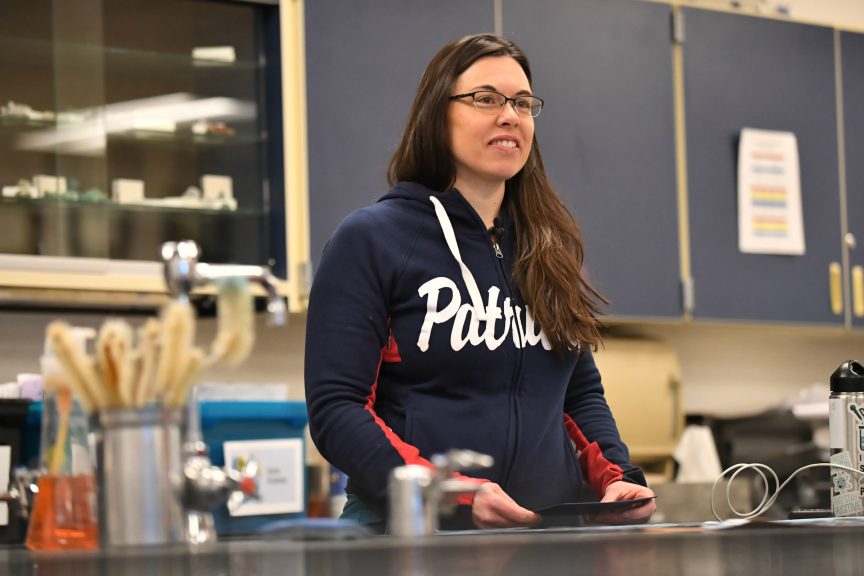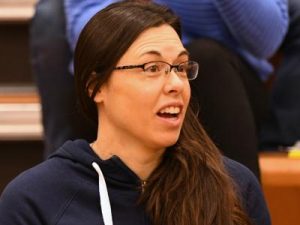 There’s never a dull moment in Rebecca Missler’s science classes at North Pole High School in Fairbanks, Alaska. Whether she has her class blazing up a fire tornado to study the Coriolis effect in earth science class or investigate the biology of an Alaska caribou to understand the animal’s impact on environment, native Alaskan culture, subsistence hunting and land forms, Missler believes in hands-on learning for her students. Rebecca also keeps her students on track with relentless positivity and personalized learning strategies that maximize individual student performance. A trained geologist who spends summers working in the paleontology department of a nearby museum, Missler is always looking for new ways to engage her students and expand their horizons. She even pursued special training and certification to be able to bring a collection of moon rocks to wow the school district’s science classes.
There’s never a dull moment in Rebecca Missler’s science classes at North Pole High School in Fairbanks, Alaska. Whether she has her class blazing up a fire tornado to study the Coriolis effect in earth science class or investigate the biology of an Alaska caribou to understand the animal’s impact on environment, native Alaskan culture, subsistence hunting and land forms, Missler believes in hands-on learning for her students. Rebecca also keeps her students on track with relentless positivity and personalized learning strategies that maximize individual student performance. A trained geologist who spends summers working in the paleontology department of a nearby museum, Missler is always looking for new ways to engage her students and expand their horizons. She even pursued special training and certification to be able to bring a collection of moon rocks to wow the school district’s science classes.
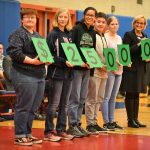 But it was Rebecca who was over the moon one morning last December at a surprise school assembly where she was presented with a Milken Educator Award by Milken Educator Awards Senior Vice President Dr. Jane Foley and Alaska Deputy Commissioner of Education Karen Melin. Check out a video of Rebecca receiving the award. Missler was named a 2019-20 recipient of the national recognition, which comes with an unrestricted $25,000 cash prize. She is the only Milken Educator Award winner from Alaska this year, and is among up to 40 honorees for 2019-20. Here are some photos of Rebecca from the awards assembly.
But it was Rebecca who was over the moon one morning last December at a surprise school assembly where she was presented with a Milken Educator Award by Milken Educator Awards Senior Vice President Dr. Jane Foley and Alaska Deputy Commissioner of Education Karen Melin. Check out a video of Rebecca receiving the award. Missler was named a 2019-20 recipient of the national recognition, which comes with an unrestricted $25,000 cash prize. She is the only Milken Educator Award winner from Alaska this year, and is among up to 40 honorees for 2019-20. Here are some photos of Rebecca from the awards assembly.
Rebecca’s LSSU Memories
Rebecca credits her alma mater, Lake Superior State University, with unearthing her love for geology. “LSSU was where I discovered my love for geology and paleontology!” she said. “The geology professors at LSSU were so excited to share their love for their science with us and we took all sorts of field trips and all the classes were very lab oriented. I still tell my students that I picked my college major based on the field trips!”
Rebecca reminisced about some of those field trips. “Lew Brown led the amazing 6 week geology field camp around the southwest US in 2002. We had flooded tents in Indiana the first night, had to spend a night in a hotel in Oklahoma to wait out a tornado, broke down in Texas and spent the day in a 115-degree parking lot waiting, hiked around New Mexico desserts with only a geologic map as a guide (this is pre-cell phones and GPS), and slept outside in snowy Colorado under tarps shivering, but we survived. It was absolutely amazing.”
“Paul Kelso led the fantastic field trips through the Appalachian mountains and around upper Michigan’s copper country. I remember cooking burritos on a campfire on the shores of Lake Superior when one of the cooking rocks exploded! I also remember the Tildon Iron Ore mine which is unbelievably massive, as are the mining trucks!”
“Associate professor Manfred Engel led many field trips around Ontario. He had great stories of his days working in coal mines in Germany. My favorite short field trip of his was to a quarry on St Joe Island in Ontario where I found a beautifully preserved trilobite fossil which I show off to my paleontology students now!”
Kudos for Rebecca
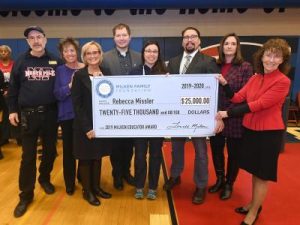 The Milken Educator Awards, hailed by Teacher magazine as the “Oscars of Teaching” has been opening minds and shaping futures for over 30 years. Research shows teacher quality is the driving in-school factor behind student growth and achievement. The initiative not only aims to reward great teachers, but to celebrate, elevate and activate those innovators in the classroom who are guiding America’s next generation of leaders. Milken Educators believe, “The future belongs to the educated.”
The Milken Educator Awards, hailed by Teacher magazine as the “Oscars of Teaching” has been opening minds and shaping futures for over 30 years. Research shows teacher quality is the driving in-school factor behind student growth and achievement. The initiative not only aims to reward great teachers, but to celebrate, elevate and activate those innovators in the classroom who are guiding America’s next generation of leaders. Milken Educators believe, “The future belongs to the educated.”
Rebecca is building a bridge to that future for her students with an emphasis on STEM education served up in an approachable, down-to-earth manner. Missler presents big-picture concepts via customizable lessons tailored to individual student needs. The result is a vibrant and engaged student body, primed to learn. A district curriculum leader, Rebecca mentors other teachers and takes the lead on spearheading new initiatives for the school district such as Next Generation Science Standards.
“A great teacher like Rebecca Missler knows that STEM education is the key to better futures for her students,” said Foley. “By providing her learners with the critical thinking skills they need to analyze any problem going forward, she helps them confront the unknown challenges that lie ahead. Her creative, analytical and practical approach is the kind of inspirational leadership we look for in Milken Educators.”
“Rebecca Missler has consistently demonstrated a commitment to her students by going above and beyond to infuse new, creative, and relevant lessons into the classroom,” said Alaska Education and Early Development Commissioner and 2008 Milken Educator Award recipient Dr. Michael Johnson. “Rebecca’s dedication to personalized learning and her innovative hands-on science curriculum have inspired student engagement and success. She brings enthusiasm and service to her classroom and colleagues, and is well deserving of this prestigious recognition.”
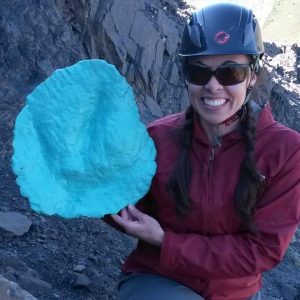
I am holding up a silli-putty peel of a Theropod track (3-toed dinosaur) we found in Denali National Park Summer 2018 as part of my paleontology field work with Dr Patrick Druckenmiller, Paleontologist at the University of Alaska Fairbanks (UAF) Museum of the North and the M.J. Murdock Partners in Science Program, a program that partner teachers with researchers.
“Rebecca Missler is such a positive force in the classroom,” said District Superintendent Dr. Karen Gaborik. “She uses hands-on activities mixed with technology to engage her students and fuel their excitement for learning. She’s also a valued colleague of her fellow teachers, always willing to be a chaperone, serve on a curriculum committee, write a pilot course for the district, or design instructional field trips.”
When asked how she wound up in North Pole, Alaska, Rebecca said, “At LSSU I worked with conodont microfossils with Dr. Lew Brown, and then I got into the University of Alaska Fairbanks geology master’s program working with Dr. Michael Whalen and conodont microfossils. I TA-ed geology labs and realized I loved teaching science more than I liked writing and the research side of science. I then transferred into the secondary education program at UAF and have been teaching science in North Pole since (just outside of Fairbanks). I now have the best of both worlds – I have a masters in teaching but I work at the UAF Museum and in Denali Park doing paleontology in the summer!”
Rebecca at Work in the Classroom
Rebecca Missler, a science teacher at Alaska’s North Pole High School (NPHS), works hard to make learning hands-on and relevant for her students. Students set sugar on fire to create “worms” (long columns of black ash) in chemistry and create a fire tornado in earth science to study induction and the Coriolis effect. Missler attended special training to be able to receive a collection of moon rocks, pieces of science history she shared with students throughout the district. It’s little wonder that her students actively participate in classroom discussions and activities, working hard and supporting each other thanks to the positive atmosphere Rebecca creates in her classroom.
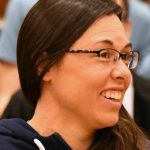
Missler works tirelessly to help others with whatever needs to be done. When the district selected a new learning management system, she requested extra training so she could help colleagues adapt to the new platform. Rebecca served on the mentoring committee for new teachers and played a large role in the district’s transition to the Next Generation Science Standards and Alaska’s State Science Standards. Her work on the district curriculum review committee led to two new classes at NPHS: paleontology and geology, both of which Missler now teaches. She has taken a deep dive into personalized learning, a current initiative in the district, adapting her lessons to students’ particular needs and looking to teaching practices around the world for inspiration. Math often gets in the way of success in chemistry, so Rebecca starts the year with a math quiz, followed by a unit that scaffolds and builds skills where students have deficits. Students show improvement in both science and math with each subsequent assessment.
Rebecca helped secure a grant to start the NPHS International Club, chaperoning trips to Costa Rica and other foreign countries in an effort to expose students to a wide variety of scientific concepts and projects. She leads the National Honors Society and Academic Decathlon. Trained as a geologist, Missler does field work that she has presented to scientists and science educators at national STEM conferences. She spent last summer working in the paleontology section of a nearby science museum.
Rebecca earned a bachelor’s degree in geology from Lake Superior State University in 2004 and a master’s in geology from the University of Alaska Fairbanks in 2016.
More information about Missler, plus links to photos and a video from the school assembly, can be found on the Milken Educator Awards website.
Milken Educator Awards
Milken Educators are selected in early to mid-career for what they have achieved and for the promise of what they will accomplish. In addition to the $25,000 prize and public recognition, the honor includes membership in the National Milken Educator Network, a group of more than 2,800 top teachers, principals, and specialists dedicated to strengthening education.
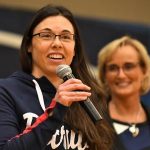 In addition to participation in the Milken Educator Network, 2019-20 recipients will attend a Milken Educator Forum in Indianapolis from March 26-28, 2020 where they will network with their new colleagues and exchange ideas with state and federal leaders on the future of education. In addition, the Milken Educator Awards’ “Why Not Us” program will pair each 2019-20 recipient with a veteran Milken Educator mentor to explore and prepare for expanded leadership roles that strengthen education practice and policy.
In addition to participation in the Milken Educator Network, 2019-20 recipients will attend a Milken Educator Forum in Indianapolis from March 26-28, 2020 where they will network with their new colleagues and exchange ideas with state and federal leaders on the future of education. In addition, the Milken Educator Awards’ “Why Not Us” program will pair each 2019-20 recipient with a veteran Milken Educator mentor to explore and prepare for expanded leadership roles that strengthen education practice and policy.
The Awards alternate yearly between elementary and secondary educators. Unlike most teacher recognition programs, the Milken Educator Award is completely unique: Educators cannot apply for this recognition and do not even know they are under consideration. Candidates are sourced through a confidential selection process and then are reviewed by blue ribbon panels appointed by state departments of education. Those most exceptional are recommended for the Award, with final selection made by the Milken Family Foundation.
The cash award is unrestricted. Recipients have used the money in diverse ways; for instance, on their children’s or their own continuing education, financing dream field trips, establishing scholarships, and even on the adoption of children.
For more information on Milken Educator Awards, visit www.MilkenEducatorAwards.org or call MFF at (310) 570-4772.
Large portions of this story were borrowed, with permission, from the Milken Educator Awards Newsroom.

Make the connection!
We are proud of our alumni and want you to remain a part of your alma mater. Stay connected through your membership in the LSSU Alumni Association. Join Today!
